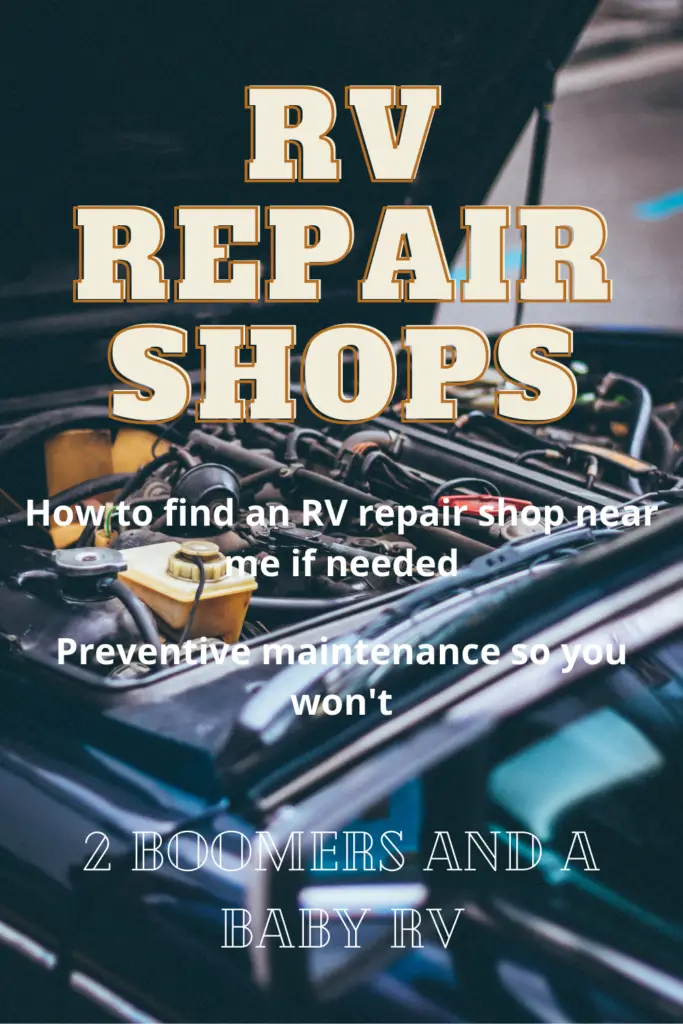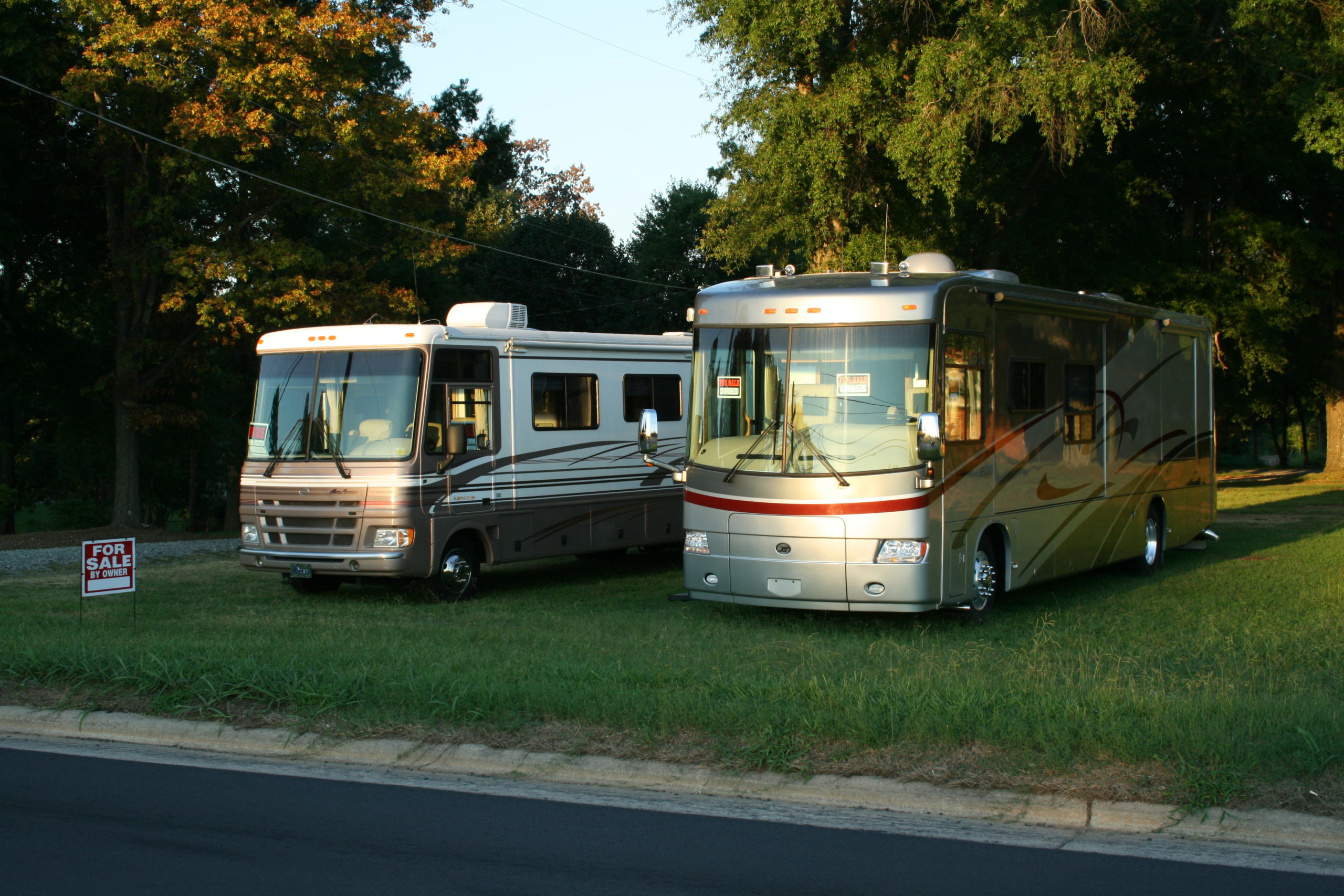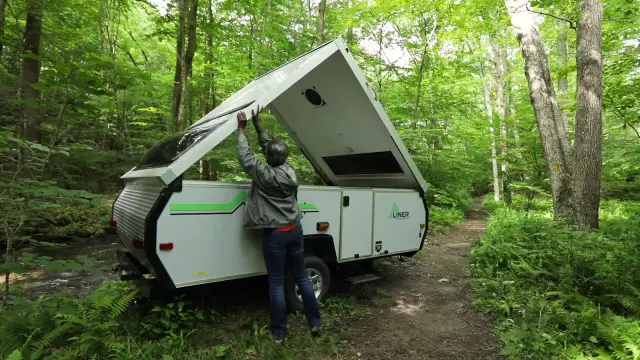I hear these questions a lot in the social circles that I am a part of. Where do I take my RV to get the oil changed? Who can change the oil in my RV generator? Where can I get my RV repaired besides taking it to the local dealer? So, How do I find RV repair shops near me when I need regular maintenance?
Actually, besides the obvious RV dealer, there are several options depending on your location, Local truck repair centers (I have provided a helpful link below). You can also call around to some local garages in your area or search for mobile repair services that may be available. Last but not least try to DIY your own repairs with a little help from YouTube and your own toolbox.
Where to start my search!
The first step is searching Google for RV repair centers near me and you may get lucky depending on where you live.
Next, depending on where you are located it may take a lot of phone calls and some asking around but at least in my area, we do have a few options besides your local RV dealer. In some locations, RV repair shops are few and far between.

After an RV dealer repair shop, the answer is not a straightforward one, but you do have options. Depending on if you are on the road or in your home town the RV repair shops option will change.
So, if in your home town it will be much easier and likely you will have time to call around. If you search RV repair places near me, there are usually a few places that handle bigger rigs like RVs. Try semi repair shops, four-wheel-drive repair shops, and maybe a small Mom & Pop depending if your repair can be done outside or needs a lift. Your search for RV repair shops may need to be a creative one.
But if out traveling on the road there are some other resources, such as a traveling repair person, ask the park for service recommendations. word of mouth from fellow campers or DIY repairs depending on your skill levels and job at hand.
One question I hear a lot is, Where can I get my generator oil changed?
Replacing the oil, air, and fuel filters, inspecting the generator exhaust, and changing the oil should all be done about once per year to avoid any unwanted surprises. If you don’t want to do it yourself, an auto shop can take care of the job for about $150.
This may take some calling around because all shops are not accustomed to working on RV generators or just don’t want to mess with it. A small shop is more likely to take this job on than one already flooded with work.
It is a somewhat easy task and there are many videos out there that will walk you through the whole process.
Moving on!
Semi repair shops
For Class C owners that are try calling Truck repair places. They do large rigs and commercial trucks and your RV chassis qualifies as a delivery truck. For Class A owners I’ve found that sometimes Bus repair companies will do that sort of work too. But usually, I just google truck repair near me. Which I just did a second ago and a list with many shops popped up. I’ll have to call them of course but reading the reviews I quickly see which ones work on RVs.
Car dealerships
Some dealerships will service your RV depending on the repair. If it is an issue with the house they will not touch it. This is really a last resort because dealerships that will work on RVs are limited. Issues related to the house of the RV will need to be a specialty shop or independent repair person. Many dealers play as RV repair shops but they are not equipped for many of the repairs. Also, they will have no parts, even for the simplest of repairs most likely.
Ford Truck Centers
I did find a Ford truck center when searching for RV repair places near me, that can handle RVs as far as the chassis is concerned. You can try and search here https://fordcommercialvehiclecenter.com/. If there is an issue with the house side of your RV, they will not assist most likely. When searching for RV repair shops, this may very well be your best option. Check the link above for locations that may be in your area.
Mobile Mechanics
You might want to have a mobile mechanic come to where your RV is stored and service it, whenever needed. Mobile RV repair shops, who knew?
A friend tried this for the first time yesterday on their 24-foot E450 Class C, and said it was great!
The mechanic checked some other things on the E450 too, while he was here. They said they will have him service our front brakes pretty soon. Service right there at home where they have the RV parked between trips.
If you can find a good mobile mechanic … it’s way better than having to drive it someplace and maybe drop it off for routine servicing.
Here is a place out of Washington State for example – https://myrvworks.com/
DIY home RV repairs
Depending on how mechanically inclined you are and your knowledge of RVs, this is a great way to save time and money.
With us being in the internet age, you can find almost any repair on YouTube. So even without the extensive knowledge you can find it and fix/repair it. If you have the location and the proper tools this is a great resource.
Here is a great place to start – CLICK HERE

How often do RVs need repairs?
Industry stats say that 3 out of every 10 RVs will need some type of major repair by only their second year, and nearly every RV will by their 8th. Engine concerns are the most common RV repair calls.
RVs break down more often than houses and vehicles. How often do RVs break down? A well-maintained RV will rarely ever break down. Conversely, a poorly maintained RV can break down almost every time it is used.
RVs are especially susceptible to issues since they are built to mimic a home that is able to be moved at any given moment. With high-end recreational vehicles, the longevity of the parts that make up your RV may increase. but you will still eventually need to repair or replace these issues.
Maintenance costs depend on the wear and tear of your RV. According to Mobile Homes Parts Store, several people who lived in RVs said they spent between $500 and $1,000 a year on maintenance costs. Some RVers spent several thousand dollars a year.
Common RV repair/replacement costs
Tire Blowouts
Average cost: $200-$350 each – mine uses 6
Plus mounting and balancing costs
Preventive Tips
To prevent a tire blowout, give your tires some extra TLC, …..after all, they are the only parts of your vehicle that actually hit the road. Inspect your tires every time you get gas and before any long trip. Look for even wear, proper tire pressure, and any punctures that may be the catalyst for a blowout.
Roof or Window leaks
Average cost: $1,000-$1,700 to reseal
Preventive Tips
The best way to prevent leaks for as long as possible is to apply a new coat of RV roof sealant once a year as a preemptive strike against broken seals. You probably already know that you can use Dicor or a similar product to tackle existing, localized leaks… but it’s way better to stop them before they start in the first place.
Next, always take the time to thoroughly check your RV for water damage before and after every single trip, as well as when you put the rig into or take it out of storage. Look for signs of stains along every seam and seal on your rig’s interior, paying special attention to roof openings like your bathroom or kitchen vent fans and your RV air conditioner.

Jacks/Stabilizers not working or need replace
Average cost: $1200-$12,000
Preventive Tips
Whether power or manual make sure to keep jacks/stabilizers lubricated and from debris. Check for any parts that may be scrapping or blocked from performing their function correctly. Check any bolts to make sure they are in place securely at all times.

Slide repair
Average Cost: $500-$1,700
Preventive Tips
Keeping your slide-out seals lubricated and soft will help extend their lifespans. A few squirts of UV-resistant 303 each time you operate your slide-out do wonders. Of course, all seals eventually harden and crack with age and use, at which point you’ll need to replace them. And as with all other parts of your rig, it’s a really good idea to check and double-check for water damage often. That way, if and when it does emerge, you can fix it before it spirals.
Lubricating your RV slide-out arms will ensure the longevity of the moving parts, which will go a long way toward preventing sticking issues. An affordable, commercially-available product like WD-40 will do the trick — and you’ll doubtless find tons of other applications for it elsewhere in your rig.
Toilet not working
Average cost: $100-$350
Preventive Tips
Check your seals regularly and keep lubricated when possible. Use RV-friendly toilet paper and treat your system. Make sure your toilet sensor is cleared off so as not to overfill the black tank. Keep the toilet bowl clean!
Battery failure
Average cost: $150-$500 depending on how many you use
Preventive Tips
Properly maintained deep-cycle batteries should last for 6 or more years. Unfortunately, some RV owners replace RV batteries every year or two. Extending battery life is not difficult; it just requires some basic care & maintenance.
Keeping your battery properly charged will prolong the life of the battery. You should also make sure terminals are kept clean at all times. If applicable, top off the water levels of the battery after it has been charged.
Batteries need to be well-maintained, even new ones. If you’re parked in storage or at an RV park, you’ve got to charge the engine battery every 7-10 days (running the engine for an hour should do the trick). The house battery should charge automatically when the RV is plugged into shore power, so if you’re having power problems at a campground, question the reliability of the shore power connection.

Engine/Transmission replace/maintenance
Average cost: $1500-$45,000
Preventive Tips
Check all fluid levels: engine oil, transmission, power steering, brakes, and windshield washer fluid. Check the air filter. A clean air filter helps your engine perform better and improves fuel economy. Check for any leaks: Look under the RV and or tow vehicle for any indications of leaks.
Refrigerator replace/repair
Average cost: $600-$3,500
Preventive Tips
Inspect the refrigerator after each drive and check for debris in the external vent. Arrange food items in the RV refrigerator to allow for air circulation. Also, you can purchase a small fan to place in the RV refrigerator to improve circulation. If possible park the RV with the refrigerator side in the shade.
Air Conditioner
Average cost: $600-$3,500
Preventive Tips
Clean or replace interior A/C filters. Clean filters will help the A/C work more efficiently. Also at least once a year clean the outside unit from dirt, leaves, and any other debris that may block the coil.
Freshwater issues
Average Cost: $200-$900
Preventive Tips
Always check all hoses and drain pipes on a regular basis. Do not dump fluids in drains that should not be in there, like grease or harsh chemicals. Check hoses for any cracks or crimps in the lines to prevent leakage.
Wastewater issues
Average Cost: $400-$3,400
Preventive Tips
Same as with the toilet system you want to inspect regularly. treat your tank with proper additives. If clogged try to snake from the exterior side first if possible
Here are some useful checklists from Campanda.com
- Maintenance & Safety Checklist
- Camping Essentials Checklist
- RV Kitchen Checklist
- RV Grocery Checklist
- Bed & Bath Checklist
- Make Your Own RV Checklist
- Download All RV Checklists

Final Thoughts
First and foremost, take care of your investment with regular checks and maintenance. Do a walk around after each trip as it only takes a few minutes but this step can go a long way to keeping you on the road.
You have spent a lot of money getting your RV and just like the family car, it needs regular servicing. Look through the list above and for your safety make sure to stay on top of items before they become a problem. This will also give you a little peace of mind as you head to your next dream destination.
Now…….
Close your eyes for a moment and just think about this. It’s sunrise, you roll out of your RV, morning air feeling brisk, fire from the night before taking its last breath as it’s trying to reignite. You find your favorite chair on the site, turn it to look out over the lake, and nestle in to relax. Birds chirping and fish jumping as the new day begins. This is what it’s all about!………. Now imagine a hot cup of coffee in your hand. Life just got so much better!
Please check us out for all your coffee needs @ the GRIND



